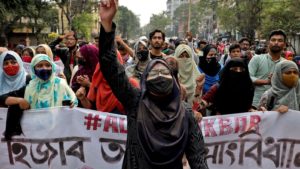Since 2013, French troops have actively supported Mali’s government in their defense against terrorism. Following the death of Muammar Gaddafi, Tuareg mercenaries in the Sahel moved to Mali to fight for independence in the north of the country. The mercenaries partnered with Al-Qaeda in the following years, threatening to seize Mali and overthrow its government.
While France felt responsible for its former colony’s prosperity, it strived to maintain its geopolitical influence in the Sahel region. Consequently, over 5000 troops were sent to Mali after the unrest began in 2013.
France’s support has been looked down upon by the Malian people and their authorities, partly due to its indecisiveness. Despite French support, the power of Islamist insurgent groups has increased. This has caused numerous Malians to criticize French effectiveness. Furthermore, the rising inefficiency of Operation Barkhane in combatting terrorism in the Sahel has led to many Malians and French criticizing the operation, pressuring France’s government to alter its strategy.
Current Situation
Evidently, the poor reputation of French support and the reciprocal lack of interest in the operation have led to discontent, as well as talk of a French withdrawal. This discontent has increased since the Malian military junta publicly criticized French intervention, urging France to abandon its mission. Following the expulsion of the French ambassador in Mali, French President Emmanuel Macron declared that his country “cannot remain militarily engaged alongside de facto authorities whose strategy and objectives are not aligned [with the French]”.
Macron also stated that France no longer trusted the Malian authorities, after their collaboration with the Russian mercenary Wagner Group. France is subsequently withdrawing its troops from Mali, halting its support for the authorities against radical Islamist terrorist groups.
Analysis
What impact the French withdrawal will have on Mali’s stability remains uncertain. It must be noted that – upon Mali’s call for help in 2013 – France’s January 11 intervention eliminated the mercenary threat in the span of a week. Despite criticisms on France’s effectiveness, the Islamic State in the Greater Sahara (ISGS) and Jamaat Nusrat al-Islam wal-Muslimin (an affiliate of Al-Qaeda) have been repetitively suppressed by the French. However, it seems such intervention has become less effective. In recent years, both terrorist groups have executed terror attacks, killing thousands of people and displacing many more. The impact the French withdrawal will have on their violence is uncertain, mostly depending on the efficacy of the contracted Russian mercenaries. What is likely is that France’s withdrawal will cause a power vacuum.
The Wagner Group has also been employed in the Central African Republic and has deployed around 2000 mercenary fighters. Its effectiveness is disputed, therefore the extent to which it will protect the Malian status quo is hard to predict. This predicament becomes more ambiguous when other Jihadist groups are taken into consideration. Forces, such as Boko Haram or Ansaroul Islam, are fighting in neighboring countries and may very well join the Jihadist fight in Mali.
At this point in time, the political consequences of France’s withdrawal are undetermined. From the French perspective, France’s military spending may fall, as some reports estimate that their presence in Mali cost around €4 million a day. The extent of this budget decrease will depend on the relocation of French troops to Niger. Emmanuel Macron is advocating in favor of this relocation, rather than a complete withdrawal. This would mean France’s military spending in the Sahel region would remain similar to what it is now.
The social consequences of the French withdrawal are also questionable. An increasing number of Malians are joining extremist Islamist groups, which may lead to a future rise in social instability. The growing Malian north-south divide will inevitably deepen. This may cause the self-proclaimed “democratic Malian military junta” to experience a fall in legitimacy and local support.
In regards to international relations, Russian intervention in African conflicts is alarming to many European and Western powers (other than France). Russia’s growing presence in Africa is magnifying its geopolitical sphere of influence, while simultaneously reducing the influence of Western powers. Moreover, Wagner’s involvement is worrying neighboring countries, as the mercenary group has reportedly committed war crimes in Libya (rape and torture being the most prominent crimes). Their approach in Mali may be more destabilizing than expected. Russia’s presence in Africa – which is portrayed by the Kremlin as solely destined for counter-terrorism – also implicitly seeks to collect the natural wealth of the region, as Mali, for instance, offers rich supplies of bauxite, gold, or even uranium.
Additionally, Russia profits heavily from its increasing influence on the African continent, with more than 15% of their arms exports finding their way to Africa. Syria, Sudan, Libya, Mozambique, and the Central African Republic represent some of the biggest African arms trading opportunities for Russia. Expansion into Mali may economically benefit Moscow even further. Despite the Kremlin officially denying their direct contact with the Wagner Group, it is suspected that the Russian authorities have implicitly supported their contracting.
The impact of France’s withdrawal from Mali is evidently not restrained to the two direct stakeholders. Other global superpowers – particularly the European Union and the United States – will concurrently be influenced, as the political and economic consequences of the French withdrawal will dynamically affect the balance of power in Africa.






